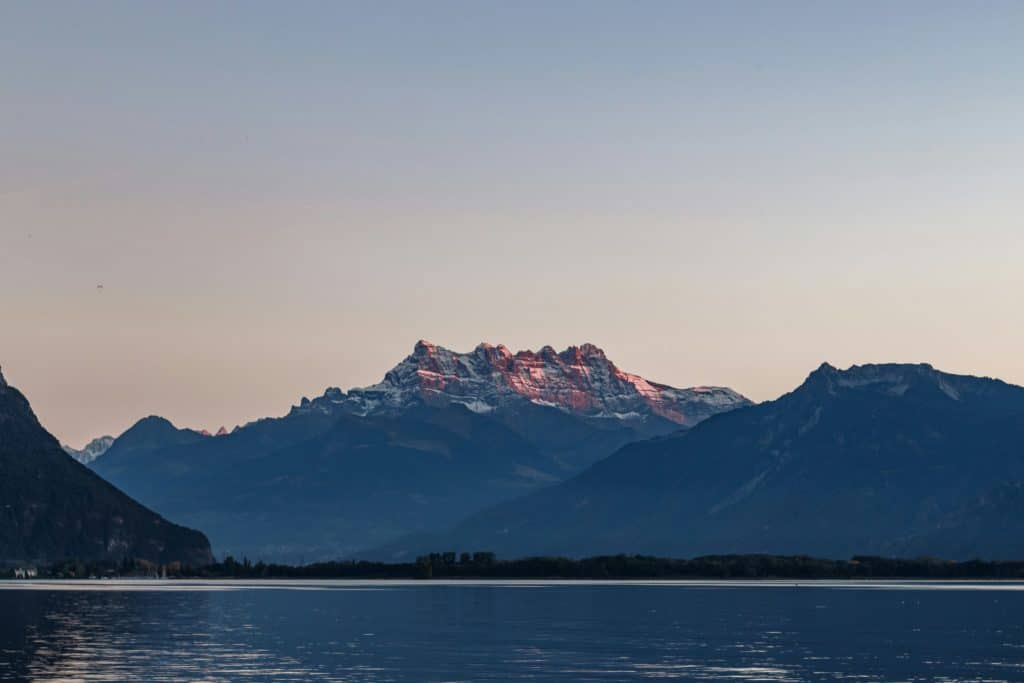Winter is here, and with it cold water swimming. Cold water? Not for everyone. Many birds come to take advantage of the warm (by which we mean unfrozen) waters of Lake Geneva to spend the winter. They 𝗮𝗽𝗽𝗿𝗲́𝗰𝗶𝗲𝗻𝘁 𝗹𝗮 𝗴𝗿𝗮𝗻𝗱𝗲 𝘀𝘂𝗿𝗳𝗮𝗰𝗲 𝗱'𝗲𝗮𝘂 𝗰𝗮𝗹𝗺𝗲 𝗲𝘁 𝗹'𝗮𝗯𝗼𝗻𝗱𝗮𝗻𝘁𝗲 𝗻𝗼𝘂𝗿𝗿𝗶𝘁𝘂𝗿𝗲.
Thanks to 𝗿𝗲𝗰𝗲𝗻𝘀𝗲𝗺𝗲𝗻𝘁𝘀 𝘁𝗿𝗮𝗻𝘀𝗳𝗿𝗼𝗻𝘁𝗮𝗹𝗶𝗲𝗿𝘀 𝗲𝘁 𝗱𝗲𝘀 𝗽𝗿𝗼𝗷𝗲𝘁𝘀 𝗱𝗲 𝗯𝗮𝗴𝘂𝗮𝗴𝗲𝘀, a great deal has been learnt about their origins and their relationship with our lake. Here are a few facts.
The birds that can be seen on Lake Geneva in winter nest in summer 𝗱𝗮𝗻𝘀 𝗱𝗲𝘀 𝗿𝗲́𝗴𝗶𝗼𝗻𝘀 𝘁𝗿𝗲̀𝘀 𝘃𝗮𝗿𝗶𝗲́𝗲𝘀. The most widespread species, the Great Crested Grebe and the Ferruginous Duck migrate from the north (NW for the former, NE for the latter). Some of the individuals present in winter remain on Lake Geneva for the breeding season.
Migration is based on seasonal changes 𝘁𝗲𝗹𝘀 𝗾𝘂𝗲 𝗹𝗮 𝗱𝘂𝗿𝗲́𝗲 𝗱𝘂 𝗷𝗼𝘂𝗿, 𝗹𝗲 𝗴𝗲𝗹 𝗼𝘂 𝗹𝗮 𝗱𝗶𝘀𝗽𝗼𝗻𝗶𝗯𝗶𝗹𝗶𝘁𝗲́ 𝗲𝗻 𝗿𝗲𝘀𝘀𝗼𝘂𝗿𝗰𝗲 𝗮𝗹𝗶𝗺𝗲𝗻𝘁𝗮𝗶𝗿𝗲. For most species, these three criteria will imply a North-South migration. The precise dates of migration are then directly influenced by weather conditions.
𝗖𝗲𝗿𝘁𝗮𝗶𝗻𝗲𝘀 𝗲𝘀𝗽𝗲̀𝗰𝗲𝘀 𝗳𝗼𝗻𝘁 𝘁𝗼𝘂𝘁𝗲𝗳𝗼𝗶𝘀 𝗲𝘅𝗰𝗲𝗽𝘁𝗶𝗼𝗻 𝗮̀ 𝗰𝗲𝘁𝘁𝗲 𝗹𝗼𝗴𝗶𝗾𝘂𝗲. An interesting example is the Red-crested Pochard. This species is widespread in Europe, from Spain to Romania. In winter, individuals converge on Lake Geneva (and other large lakes in the region), following a west-east axis.
The workforce changes in line with certain environmental upheavals. For example, 𝗹'𝗮𝗿𝗿𝗶𝘃𝗲́𝗲 𝗱𝗲 𝗹𝗮 𝗠𝗼𝘂𝗹𝗲 𝘇𝗲́𝗯𝗿𝗲́𝗲 𝗲𝗻 𝟭𝟵𝟲𝟮 has led to a massive increase in the wintering numbers of scaups and coots, which are fond of this small shellfish. Another example, 𝗹𝗲 𝗿𝗲𝘁𝗼𝘂𝗿 𝗱𝗲𝘀 𝗖𝗵𝗮𝗿𝗮𝗰𝗲́𝗲𝘀, aquatic plants indicative of improved water quality, has led to an increase in herbivorous birds such as the Red-crested Pochard and Gadwall.
𝗟𝗲 𝗿𝗲́𝗰𝗵𝗮𝘂𝗳𝗳𝗲𝗺𝗲𝗻𝘁 𝗰𝗹𝗶𝗺𝗮𝘁𝗶𝗾𝘂𝗲 also influences these migrations. Milder winters in the Nordic countries are attracting more scaup, goldeneyes and herring gulls than ever before. Further south, increasing drought in the Iberian Peninsula is driving the migration of the Red-crested Pochard.
There are more wintering birds today than at the beginning of the 20th century. ᵕ𝗼𝗻𝗻𝗲 𝗻𝗼𝘂𝘃𝗲𝗹𝗹𝗲? This is a sensitive subject. Some fish-eating species are seen as competitors by fishermen. While we now know that the Great Crested Grebe, a protected species, does not cause damage to lake fish stocks, the Great Cormorant is more regularly singled out for criticism.
Photo credits :
![]() A. Pochelon
A. Pochelon![]() A. Pochelon
A. Pochelon
Sources :
![]() Keller (2011), Switzerland, a winter refuge for waterbirds.
Keller (2011), Switzerland, a winter refuge for waterbirds.![]() Acting for biodiversity | Haute-Savoie Waterbirds wintering on Lake Geneva
Acting for biodiversity | Haute-Savoie Waterbirds wintering on Lake Geneva


